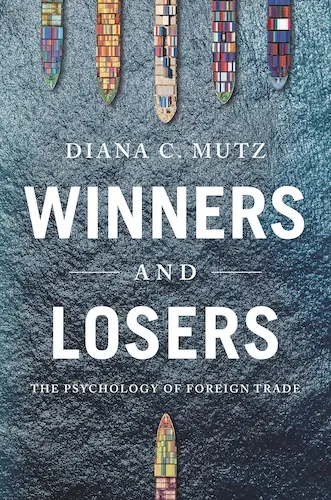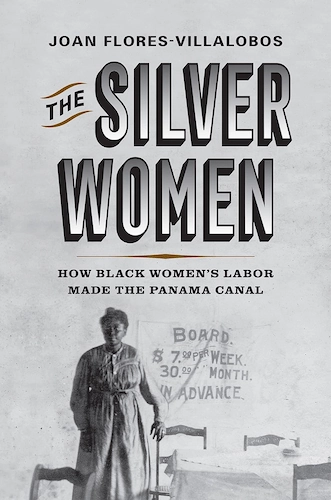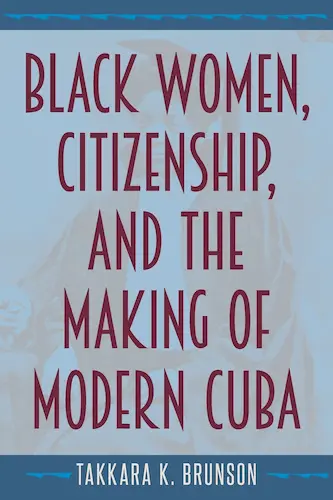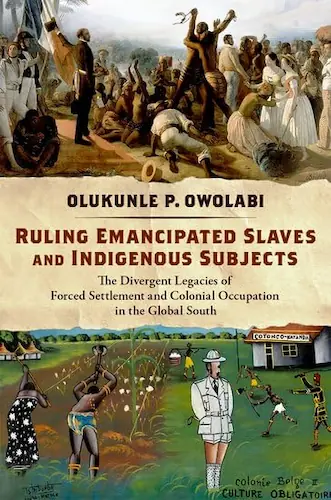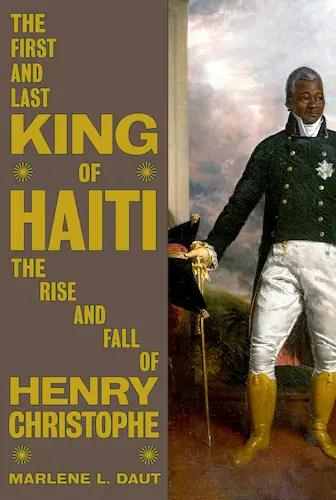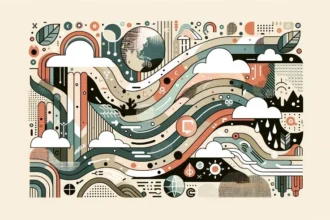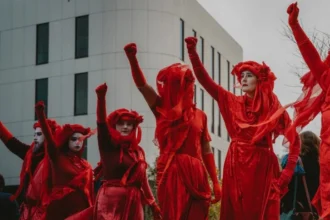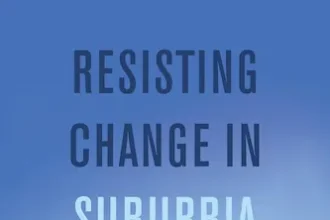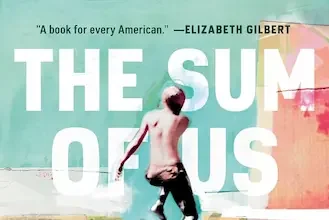A Fresh Take on Food and Climate
Winner of the 2025 IBPA Gold Award, The Blue Plate: A Food Lover’s Guide to Climate Chaos by ecologist Mark J. Easter offers a grounded, data-rich, and surprisingly hopeful take.
- A Fresh Take on Food and Climate
- Climate and Carbon in the Kitchen: A Dish-by-Dish Approach
- Sustainable Food Systems in Practice: From Landfills to Fish Farms
- Soil and Climate Justice: History, Carbon, and Memory
- Can Food Fix the Climate Crisis? Realistic Hope in Action
- A Climate-Friendly Diet Without Dogma
- Why Climate-Friendly Food Choices Matter Now
- Climate Solutions Start on Our Plates
In a publishing landscape filled with dire warnings about environmental collapse, this timely and engaging book takes a granular look at how everyday meals are entangled with planetary health—and how small, realistic changes in agricultural practices and consumer choices could yield powerful climate benefits.
More than just a call to conscience, Easter’s work positions food as a fulcrum for systemic change. In an era when climate discourse often alienates the average reader, The Blue Plate invites everyone to the table—literally and figuratively—by rooting climate awareness in something as universal as eating.
Climate and Carbon in the Kitchen: A Dish-by-Dish Approach
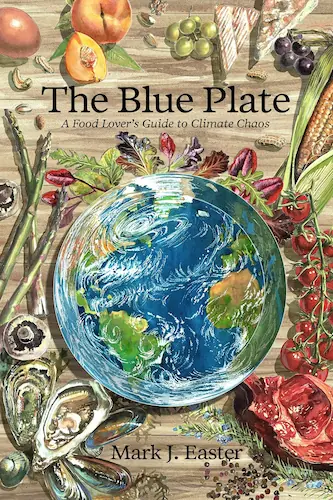
The book’s structure is simple and effective: each chapter is organized around a classic American dish—bread, steak, chicken, salad, pie—used as a lens to examine different components of the food system.
With this digestible format, Easter helps readers understand how greenhouse gases are released at every stage of food production, from soil degradation and fertilizer use to livestock methane and long-haul transportation.
But unlike abstract policy tomes, Easter’s approach is deeply accessible: he asks how a humble piece of toast or a steak dinner can alter the climate—and answers with field visits, science, and story.
This narrative strategy also improves reader retention, as it anchors environmental science in familiar contexts. By connecting emissions data to tangible meals, Easter bridges the gap between global crisis and daily decisions, making climate-conscious eating both relevant and actionable.
Sustainable Food Systems in Practice: From Landfills to Fish Farms
What elevates The Blue Plate above many other sustainability books is Easter’s commitment to first-hand observation. He travels across the U.S., visiting regenerative farms in Colorado, methane-leaking landfills, Idaho fish farms, and Arizona produce growers.
He listens to farmers who are rebuilding soil carbon and reducing chemical inputs. He even highlights the role of pastured livestock and shellfish farming as tools for carbon drawdown. The result is a sweeping yet personal portrait of an agricultural system already in motion—slowly shifting toward sustainability from the ground up.
Easter’s deep fieldwork enhances the book’s credibility, offering rich, locally grounded examples that transcend generic environmental rhetoric. His vivid accounts transform complex processes into memorable stories, giving readers a textured understanding of what a just and climate-smart food system might look like.
Soil and Climate Justice: History, Carbon, and Memory
Easter’s storytelling gains added weight from his personal history. His great-grandmother, a farmer during the Dust Bowl, unknowingly contributed to one of the largest carbon releases in U.S. history by exhausting the soil of its organic matter.
That legacy of soil degradation—what Easter calls the depletion of “ecosystem capital”—is central to the book’s message. Rebuilding that capital, one farm at a time, is not only possible but already underway, driven by farmers who treat soil not as dirt but as living infrastructure.
By framing soil as a historical actor, Easter challenges us to reimagine land not merely as a resource but as an archive—one that holds both the damage of past practices and the potential for future restoration. It’s a powerful reframing that aligns ecology with ethics and memory.
Can Food Fix the Climate Crisis? Realistic Hope in Action
Easter’s central question is deceptively simple: Can we eat our way out of the climate crisis? His answer: a nuanced partial yes. Changing what we eat is not enough on its own—we must also stop burning fossil fuels. But food systems are one of the few carbon-intensive sectors where drawdown is possible.
Explore Books Written by Our Contributors
With practices like cover cropping, no-till farming, composting, and carbon farming, agriculture can become a climate solution rather than just a climate problem. And that shift doesn’t require radical consumer sacrifice: just better sourcing, fewer air-freighted goods, and a deeper understanding of soil.
His argument draws strength from its realism. Rather than positioning consumers as climate saviors, Easter underscores the importance of systemic support—from policy to infrastructure—to enable broad adoption of regenerative practices. Personal change, in his view, becomes powerful when backed by collective will.
A Climate-Friendly Diet Without Dogma
Unlike more didactic environmental books, The Blue Plate avoids moralizing. Easter doesn’t call for an end to meat-eating or the universal adoption of veganism. Instead, he encourages moderation, local sourcing, and support for regenerative producers. By focusing on the systems behind our plates—not just personal virtue—he reframes food not as guilt but as agency. This makes the book an ideal entry point for readers who want to engage without being overwhelmed.
By emphasizing progress over perfection, Easter cultivates a tone of practical optimism that is rare in climate literature. He makes it clear that while no single solution will suffice, each informed decision contributes to a larger ecological transformation.
Why Climate-Friendly Food Choices Matter Now
As climate anxiety spreads, Easter’s work fills a crucial gap: it gives readers agency. By tracing emissions back to familiar meals and offering real-world examples of farmers and scientists doing things differently, The Blue Plate reframes climate action as something both intimate and collective. It reminds us that agriculture is one of the few sectors where individuals can have a meaningful impact—and that impact begins with understanding where our food comes from.
The book’s release is particularly timely as more consumers seek transparency and accountability in what they buy and eat. Easter taps into this cultural shift, encouraging readers to use their purchasing power and policy voice to advocate for climate-smart food systems.
Climate Solutions Start on Our Plates
Mark J. Easter’s The Blue Plate is a rare book: scientifically rigorous, politically aware, and deeply readable. It makes a powerful case that how we grow, ship, and consume food matters—not just for individual health or culinary pleasure, but for the future of the planet. By turning the dinner plate into a map of climate choices, Easter offers a vision of sustainability that is inclusive, hopeful, and urgently needed.
This is not just a book for foodies or farmers—it is essential reading for anyone who wants to understand the intersection of climate, culture, and consumption. With clarity and heart, Easter invites us to see food not as a private matter but as a public opportunity for climate repair. The book is available here.



